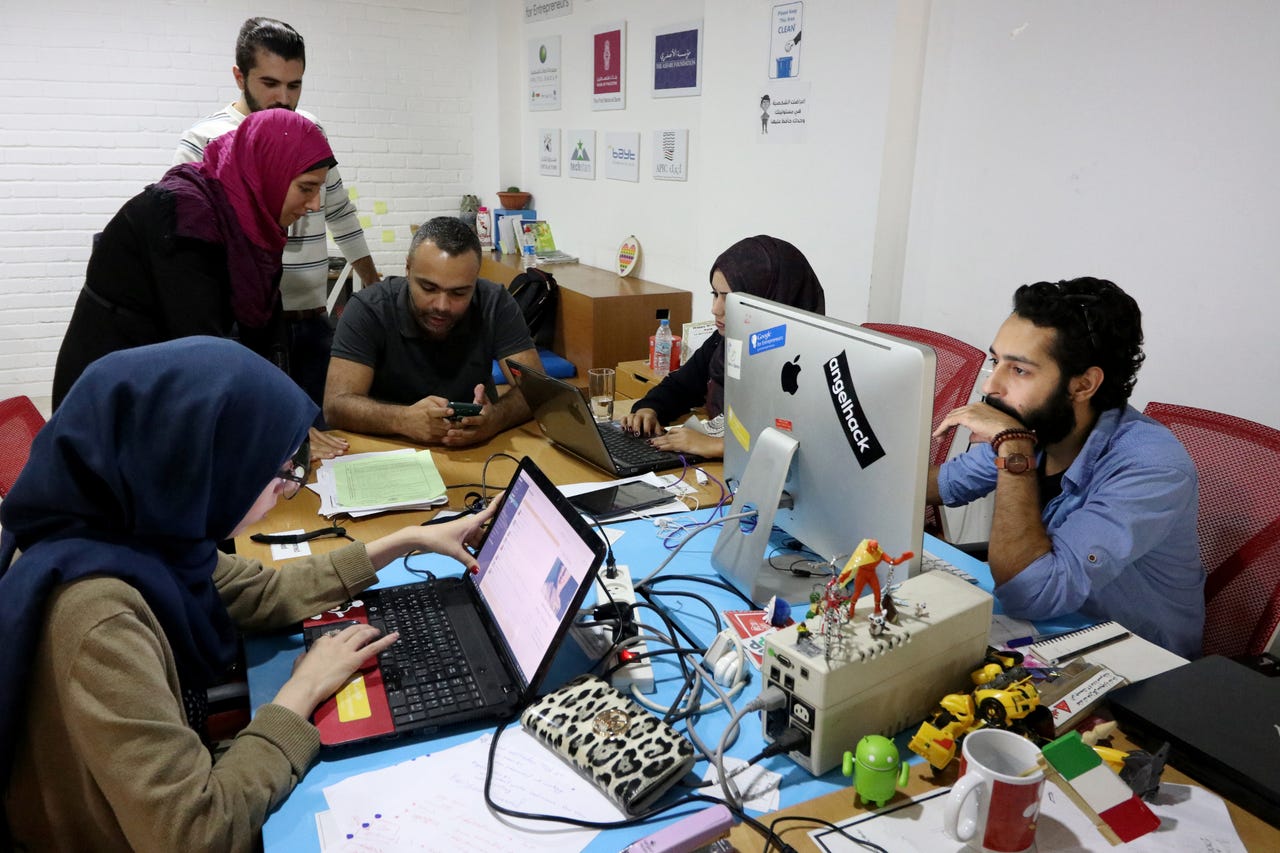With tech skills but not enough electricity, meet Gaza's first startup accelerator


Gaza Sky Geeks says its efforts have gone into creating a safe, vibrant, artistic, and creative community of designers, engineers, and other geeks.
Gaza may seem an unlikely place to want to create a tech startup, but accelerator and co-working hub Gaza Sky Geeks is aiming to change that perception.
GSG's most recent effort is a crowdfunding campaign to launch Gaza's first coding academy. It's so far raised about $279,000, comfortably exceeding the initial $95,000 target.
The funds will help staff the academy, as well as purchase a generator and fuel, so that coders and entrepreneurs can work during Gaza's frequent power outages.
"On average we now receive four non-consecutive hours of electricity per day, some of our neighborhoods only get one hour. We used to get eight-hour cycles," the team notes on its crowdfunding site
"In a crunch, we charge our phones and laptops with car batteries, but such methods are unreliable and not scalable and the problem is chronic. So that startup founders and freelancers can compete at an international level, we need to reliably power up our laptops and mobile phones and access internet and light for at least 12 hours each day, every day of the week."
Access to power may be something that many of us take for granted, but it's not a given for Gaza's young, tech-literate population.
GSG director Ryan Sturgill tells ZDNet that with unemployment for people aged under 30 years at over 50 percent, technology can help to address vital socio-economic issues.
"Increasing coding skills and access to in-demand technologies boosts Gazans ability to build products that can be competitive around the world," he says.
GSG's figures suggest that developers in Gaza typically earn around $400 per month so, it argues, a $20,000 seed-level investment has the purchasing power of $400,000 in the US. That cost advantage, GSG contends, means investors can access talent and test ideas at a lower cost than in many other markets.
"All our startups and freelancers are serving markets abroad and regionally, not locally, but access to professional experience and top-tier coders is limited due to the border closures," Sturgill says.
"We hope to bring cutting-edge tech skills to Gaza through this coding academy and, after six months of intensive training, deliver developers who can ship high-quality software products and work as part of teams in global tech companies."
The knock-on effect of that achievement, Sturgill believes, "will help bring high-quality jobs to Gaza through remote employment and [by] increasing the talent base of Gazan outsourcing companies".
These efforts could help provide an economic lifeline for much of Gaza's population. The territory is densely populated, with record levels of unemployment and a large dependency on humanitarian aid.
"GSG is really an ecosystem-building enterprise, and we're doing more than just delivering educational content or coaching individual startups," Sturgill says.
"A huge part of our work over the past year has been creating a safe, vibrant, artistic, and creative community of designers, engineers, and other geeks to meet each other, build teams, live normal lives and build great products. That's no small feat in a place where there's little electricity, little to do, and plenty of things to be negative about."
Gaza's population is roughly the same as San Francisco's and San Jose's combined. Its 1.85 million inhabitants have a young, well-educated, urban demographic. Nearly 67 percent of Gazans are aged under 24 years, with literacy levels above 96 percent and high levels of tertiary education.
They are hungry for the creative and employment opportunities that technology can provide. GSG, formed in 2011 with support from Google and NGO Mercy Corps, aims to help facilitate these ambitions.
"I arrived at GSG thinking I would be more focused on doing investment deals or dealing with more technical issues, but I realized from our staff and the community how critical it is to foster social bonds, interaction, and connectivity when building a tech ecosystem," Sturgill says.
Sturgill, who has an MBA from MIT and a master's in public policy at the Harvard Kennedy School, has a deep affinity with the region, having studied Arabic in college and lived in Egypt.
Before moving to GSG a year ago, he had been advising small businesses on investment issues in places like Iraq, Afghanistan, and Pakistan. He sees his current role as the "perfect opportunity to work hands on with entrepreneurs again in a place I care deeply about, and make a big impact on the investment and startup ecosystem in Palestine".
Aside from their current crowdfunding campaign, Sturgill's team at GSG also incubate startups, and support freelancers and developers. For example, it teaches them how to use freelancing platforms such as Upwork, and run a co-working space in downtown Gaza City.
Equipped with high-speed fiber internet, Sturgill describes GSG as "a vibrant hub where startups, small tech companies, and freelancers come to work, and hundreds of people a month participate in educational events in our workshop rooms".
"A critical part of [our work] is also deliberate outreach to women working in tech and anyone trying to earn an income through the internet," he adds.
After hitting its initial funding goal within 10 days of launching, GSG's extended target of $400,000 also includes facilitating 22 internships for Gazans in European and US tech firms, and training high-school girls to code.
Since late 2013, 11 startups supported by GSG have received seed investment offers. One is currently seeking follow-on investment. Sturgill believes the coding academy can complement this fundraising by giving "Gazans the ability to build products that can be competitive around the world".
It's a vision clearly shared by GSG's partners and funders. Since 2014, GSG has received Google for Entrepreneurs' citizenship award, secured funding from the Techstars Foundation and helped create more than 100 jobs and $91,000 in revenue via startups and freelancing.
Meanwhile, volunteer mentors from Uber, Google, SoundCloud, Groupon, ThoughtWorks, Microsoft, and other tech companies, as well as venture capitalists and startup founders, have paid their own way to come to Gaza and mentor their startup.
Alongside plans for their Coding Academy, GSG is also exploring further opportunities to refine and expand business.
"We're focusing on improving our incubation and acceleration model, and expanding our freelancing training work. We also hope to expand outside Gaza City in the near future, potentially opening a safe, vibrant space in another area of Gaza and eventually the West Bank," Sturgill says.
"Building businesses and creating economic opportunity, especially for young people, is critical here," Sturgill says. The success of GSG's current crowdfunding campaign shows that many others clearly agree with him.